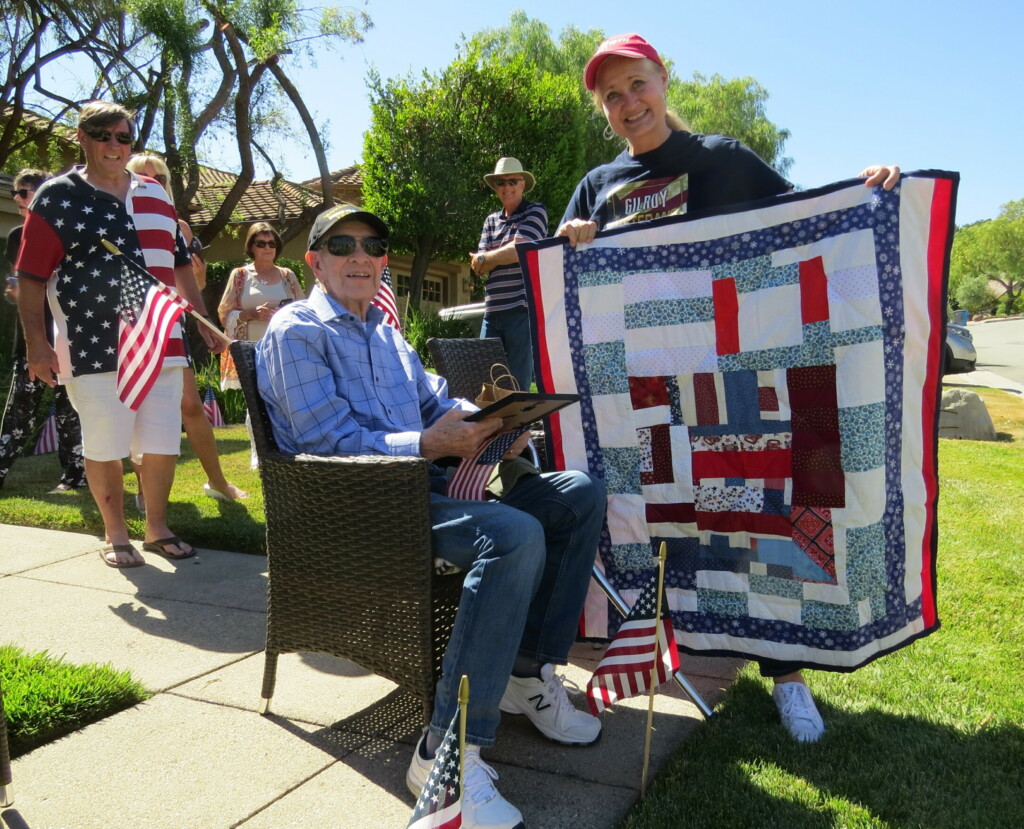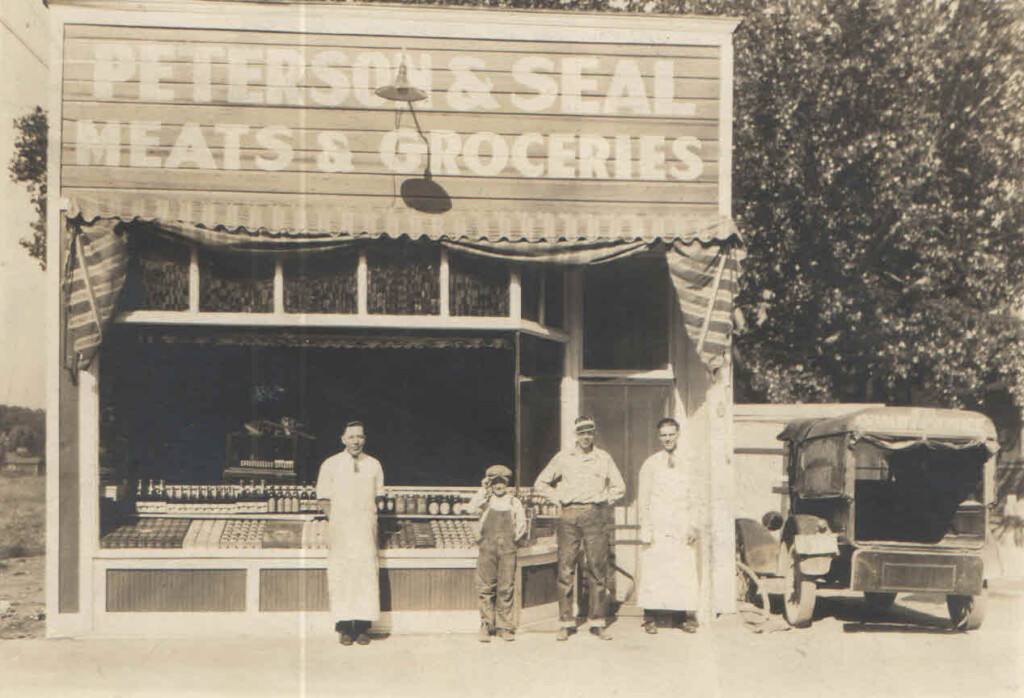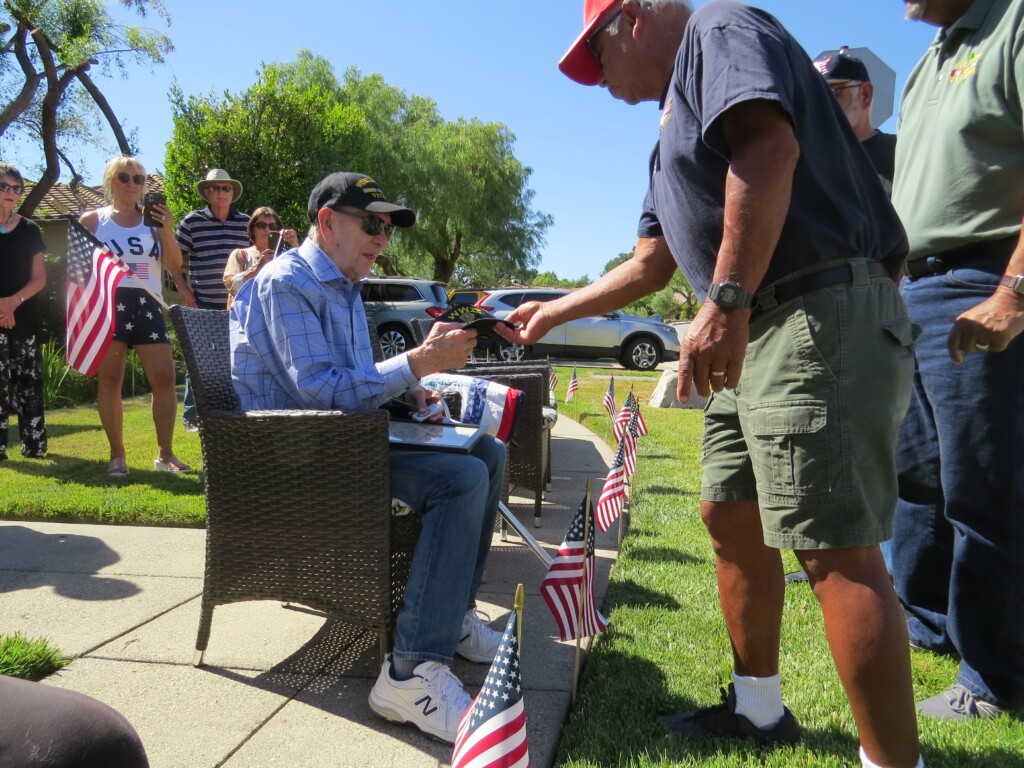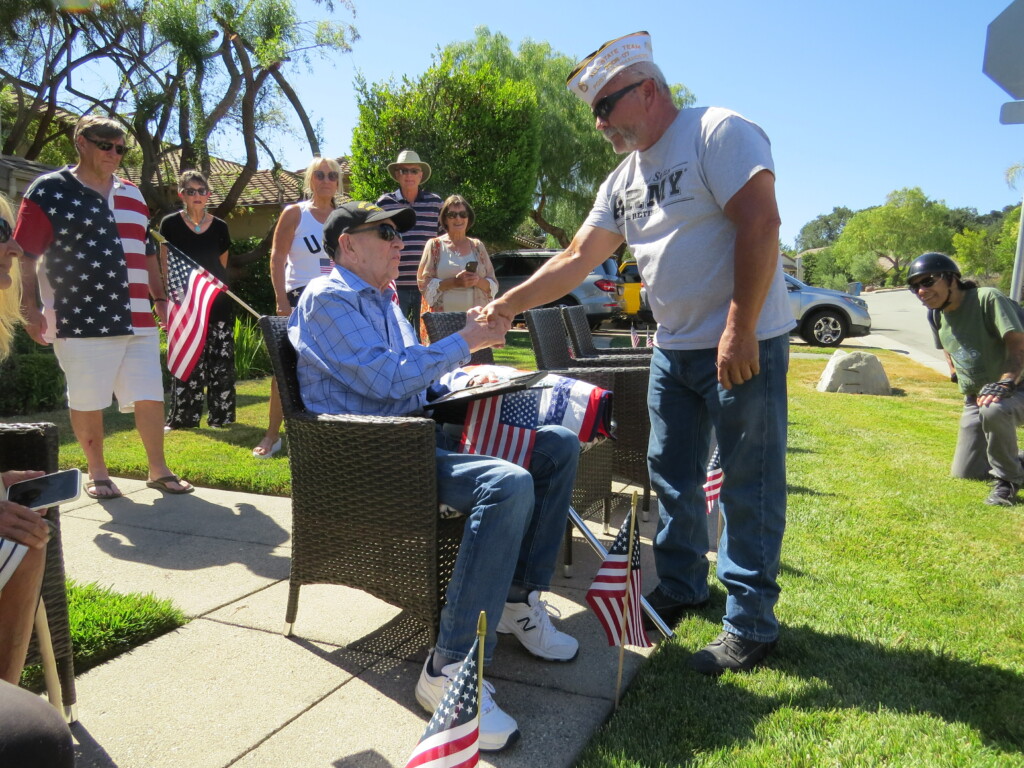Main story: Gilroy WWII veteran honored for his service as he turns 99
Robert “Bob” Peterson risked his life in South Pacific to fight for freedom
![]()

World War II veteran Robert Peterson is presented with a lap quilt by Gilroy Veterans Hall Executive Director Christine West. Photo by Marty Cheek
By Marty Cheek
Robert “Bob” Peterson sat on a chair on the sidewalk of his home in west Gilroy the afternoon of June 30 waiting with friends and family for a special birthday surprise. About 4 p.m., a small convoy of cars, trucks and motorcycles passed along Stonecress Street. Driven by veterans, they honked horns and shouted greetings to express their appreciation for the World War II U.S. Army vet who in two days would turn 99.

Robert Peterson was promoted to staff sergeant. Photo courtesy Robert Peterson
A short while later, a dozen or so of his fellow military veterans saluted Peterson warmly and presented various birthday gifts, including a home-made walking cane, a commemorative coin, a patriotic lap quilt, and other small tokens of appreciation. Afterwards, everyone gathered in the backyard for beers and barbecue and to listen to Peterson’s stories serving in the South Pacific as a forward observer for the 136th Field Artillery Battalion.
Peterson is one of three or four known surviving World War II vets residing in Gilroy, said John Ceballos, president of board of directors of the South Santa Clara Valley Memorial District, which operates Gilroy Veterans Memorial Hall. A Vietnam War Navy veteran, Ceballos said his own war experiences appreciates the sacrifices World War II veterans made in service to America.
“We want to honor them not just on Independence Day and Veterans Day but we want to honor them all the time,” he said. “We appreciate them and want to make sure they’re still remembered not just by their families but by the veteran population.”
Out of 16 million Americans who fought in World War II, about 240,000 are thought to be still living. They’re known as “the Greatest Generation” for a good reason — they saved civilization by fighting fascism, Caballos said.

The Peterson family’s grocery store in Salt Lake City where Bob Peterson first learned the business. Photo courtesy Robert Peterson
Peterson was born July 2, 1923 in Salt Lake City. In that Utah community, he worked as a young teen at the family grocery store owned by his father, Art. Aspiring to follow his father in the operations of a grocery store, he attended the University of Utah where he studied for a degree in business marketing.
After the U.S. entered the war following the attack on Pearl Harbor, Peterson received a draft letter. He told the draft officers: “You guys can’t draft me. I’m busy working for my dad.” They told him. “That’s tough, kid, but we need you in the Army.”
The young man’s life changed in December 1942 when he went to Camp Roberts in California for 13 weeks of basic training. On June 1, 1943, proudly wearing his Army uniform, he boarded the USS President Monroe docked in San Francisco Bay. As the crowded transport ship passed under the Golden Gate Bridge, the young man couldn’t help wondering if he would ever set foot on his homeland again.
 The journey to the South Pacific’s Solomon Islands took about two weeks. Peterson and his comrades in arms faced rough seas on occasion that made them sick or spent endless hours in drudgery of having little to do onboard to pass the time. About 11 days into the voyage, he heard the blast of the fog horn and he witnessed the ship’s gun crews rush into position. An enemy sub had been seen. Peterson’s mind raced with the realization he was entering the war zone.
The journey to the South Pacific’s Solomon Islands took about two weeks. Peterson and his comrades in arms faced rough seas on occasion that made them sick or spent endless hours in drudgery of having little to do onboard to pass the time. About 11 days into the voyage, he heard the blast of the fog horn and he witnessed the ship’s gun crews rush into position. An enemy sub had been seen. Peterson’s mind raced with the realization he was entering the war zone.
When he finally stepped off the ship and found himself standing on the beach of the island of Bougainville, he realized he and his comrades were the replacements for the men coming back from battle. He saw soldiers who were wounded or dead. It shocked him to see the damage to a man that results from war.
Because of his ROTC training in college, the Army promoted Peterson to staff sergeant. The title came with tremendous risks to his life because his duties as a forward observer required him to secretly approach close to the Japanese soldiers so he could help the gunmen target the enemy’s island bases.
“I would observe what the enemy was doing and then I would (radio) call the head of the artillery and tell them what to do, I would give them the coordinates,” he said in describing the dangerous job. “I was up front ahead of everybody . . . It was so frightful. I knew I was risking my life every single day. I would try hard physically and mentally to know that whatever I was doing is the right thing because I wanted to save America.”
 During one bombing attack, his leg was wounded with shrapnel. His commanders tried to send him to the hospital, but he stubbornly refused. He said he needed to be observing the enemy, and despite the pain he went back into action.
During one bombing attack, his leg was wounded with shrapnel. His commanders tried to send him to the hospital, but he stubbornly refused. He said he needed to be observing the enemy, and despite the pain he went back into action.
On another occasion, Peterson found himself trapped at the top of a building as enemy soldiers entered on the ground floor. Terrified at the thought of being captured or killed, there was nothing he could do except be quiet and pray he wouldn’t be discovered.
On Dec. 19, 1945, Peterson was honorably discharged from the Army. He received a Purple Heart for the shrapnel wounds he received in Bougainville. In a short memoir he wrote about his wartime experiences, he described the heavy emotions of returning to the U.S.:
 “I had been overseas for thirty months now and was beginning to feel that I would never get home. But after the war ended all I could think about was home and all of the fun I could have when I got there. It was the first time I had felt relieved and happy for many months and every day seemed like a year while I was waiting for that ship to take me back to America. Finally, that ship ride home started and after 13 days we were going under the Golden Gate Bridge. As we passed under the bridge, I felt thankful to God and all the world that I was home at last, and that I was an American and could live in such a wonderful country.”
“I had been overseas for thirty months now and was beginning to feel that I would never get home. But after the war ended all I could think about was home and all of the fun I could have when I got there. It was the first time I had felt relieved and happy for many months and every day seemed like a year while I was waiting for that ship to take me back to America. Finally, that ship ride home started and after 13 days we were going under the Golden Gate Bridge. As we passed under the bridge, I felt thankful to God and all the world that I was home at last, and that I was an American and could live in such a wonderful country.”
Peterson went back to work at his family’s grocery business. He met a beautiful woman named Bernice and married her.
The couple had two daughters, Sue Ann and Karen. Their marriage would last more than 60 years until Bernice died about nine years ago.
In 1954, Peterson’s father purchased a grocery store in Palo Alto and sent the young veteran to the Bay Area to manage it. The business grew to two stores and eventually they would be sold and the father and son purchased a new store in Los Altos, which they owned for 40 years.
 Eight years ago, Peterson moved to Gilroy to live in the home of his daughter Sue Ann Rulfs and his son-in-law Jim Rulfs. He considers himself a fortunate man to receive the recognition from his family and friends and his fellow Gilroy residents in celebrating his 99th year.
Eight years ago, Peterson moved to Gilroy to live in the home of his daughter Sue Ann Rulfs and his son-in-law Jim Rulfs. He considers himself a fortunate man to receive the recognition from his family and friends and his fellow Gilroy residents in celebrating his 99th year.
In the living room of his home, he described his thoughts as a young soldier serving his country and commented on the importance of appreciating the blessings of liberty and fighting to preserve them:
 “I just thought America is the best place. Our freedoms are so much better here than any place else and that the risks that I’m taking were worth it,” he said in recollection. “When I came back, I thought America is so wonderful and that I’m so lucky to be alive,” he said. “I figured all the time, I’m damn lucky to be alive, even though I was wounded and still hurting. I was better off than people who lost their lives.”
“I just thought America is the best place. Our freedoms are so much better here than any place else and that the risks that I’m taking were worth it,” he said in recollection. “When I came back, I thought America is so wonderful and that I’m so lucky to be alive,” he said. “I figured all the time, I’m damn lucky to be alive, even though I was wounded and still hurting. I was better off than people who lost their lives.”
